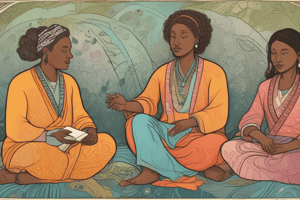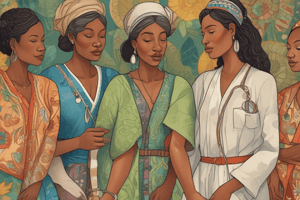Podcast
Questions and Answers
What should nurses do when faced with a terminal or serious diagnosis?
What should nurses do when faced with a terminal or serious diagnosis?
- Reveal clinical findings only to the family members
- Avoid discussing the diagnosis with the patient
- Disclose clinical findings immediately to the patient
- Explore the patient's preferences regarding disclosure early on (correct)
In what context should nurses gently explore issues with elderly patients?
In what context should nurses gently explore issues with elderly patients?
- When asking about dietary preferences
- When assessing pain levels
- When disclosing clinical findings (correct)
- When discussing treatment options
What does nodding in older patients of Chinese origin typically indicate?
What does nodding in older patients of Chinese origin typically indicate?
- Agreement with medical facts
- Understanding of medical facts
- Responsiveness, not necessarily comprehension (correct)
- Respect for the healthcare provider
How do Traditional Chinese people view illnesses?
How do Traditional Chinese people view illnesses?
What is the concept of mental wellness according to the text?
What is the concept of mental wellness according to the text?
What is the 'sick' role mentioned in the text?
What is the 'sick' role mentioned in the text?
Why might some individuals avoid surgery according to the text?
Why might some individuals avoid surgery according to the text?
Flashcards are hidden until you start studying
Study Notes
Cultural Knowledge and Competence
- Cultural knowledge is the process of seeking and obtaining a sound educational base about culturally diverse groups.
- It involves familiarizing oneself with selected cultural characteristics, history, values, belief systems, and behaviors of members from other ethnic groups.
Hispanic/Latino Culture
- The Hispanic/Latino region covers over 40 countries and has a rich array of spiritual traditions, including African cultural influences.
- Eye contact is valued, and touching the shoulder or upper arm is a common greeting.
- May send money back home to support family members.
African American Culture
- Involved in religious institutions, often with discomfort and mistrust of the healthcare system.
- Fear of life-threatening or debilitating diseases, and perception that diagnostic procedures are an invasion of privacy.
- Acceptance of larger body sizes, and less guilt about overeating.
Sub-Saharan African Culture
- Diverse with over 450 languages and cultural traditions.
- Family is defined broadly, and greetings require shaking hands and asking about the individual's and their family's health.
- Family ties imply extensive monetary and other obligations.
Cross-Cultural Negotiation and Communication
- The BELIEF Instrument is a preclinical teaching tool that helps in understanding cultural differences in health beliefs and behaviors.
- Elements of cultural competence include awareness, knowledge, skills, encounters, and desires.
What is Culture?
- A learned set of shared interpretations about beliefs, values, and norms that affect the behavior of a relatively large group of people.
- Culture is dynamic and involves factors such as geography, age, socioeconomic status, religion, gender, education, language, politics, and sexual orientation.
Developing Cultural Awareness
- Requires self-examination of one's own bias towards other cultures and recognition of racism and other "isms" in healthcare delivery.
- Involves developing sensitivity and understanding of another ethnic group through communication, observation, and flexibility.
Specific Cultural Variations
Native American Culture
- Family pride and honor are important, and prefer to be treated by a medical practitioner of the same sex.
- Fasting is required during certain times, and left hands are used for toilet hygiene.
Eastern European Culture
- Religions in the region include Orthodox Christianity, Islam, and Judaism.
- Relatives provide moral and physical support to each other, and several generations may live together.
Muslim Culture
- May not eat or drink during the holy month of Ramadan, and may refuse medications during this time.
- Sick and elderly Muslims may be exempt from fasting during Ramadan.
Mental Illness and Culture
- Mental illness may be attributed to supernatural causes, such as evil spirits or possession.
- Folk remedies and spiritual measures may be used to prevent or cure mental illness.
Tips for Nurses
- Explore each patient's preferences regarding disclosure of clinical findings early in the clinical association.
- Be sensitive to cultural differences in communication and disclosure of clinical information.
Chinese Culture
- Older patients may be polite and nod, but this does not necessarily indicate agreement or understanding of medical facts.
- May avoid contact with healthcare providers as a sign of respect for authority.
- Traditional Chinese people believe in the concept of yin and yang, and mental illness may be attributed to an imbalance of these energies.
Studying That Suits You
Use AI to generate personalized quizzes and flashcards to suit your learning preferences.




